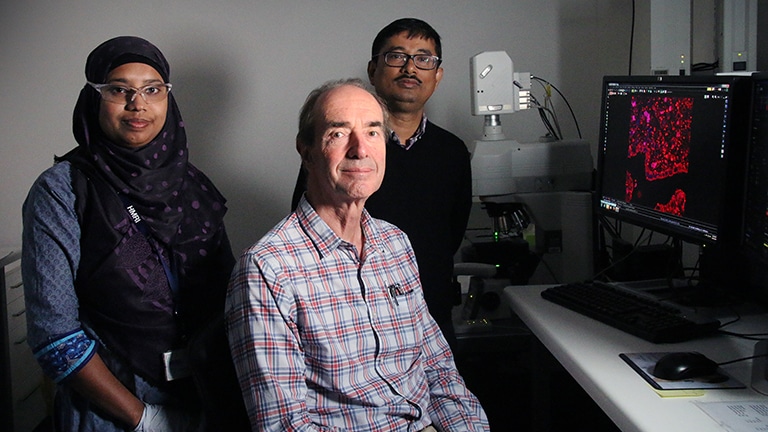
A pregnancy research team has discovered that stillbirths can be triggered by ageing of the placenta, depriving unborn babies of oxygen and nutrients.

A pregnancy research team led by Laureate Professor Roger Smith AM has discovered that stillbirths can be triggered by ageing of the placenta, depriving unborn babies of oxygen and nutrients in the vital late stages.
Around 1 in 200 pregnancies in Australia end in this devastating outcome, but it is even more common in developing countries. Predicting stillbirth has previously been extremely difficult.
The research study began five years ago when Laureate Professor Smith looked at the natural ageing process in adults.
“When I looked at the data on stillbirths – with that definition of ageing in mind – it screamed to me that stillbirth is related to the ageing of the placenta,” he told ABC News. “That was the key idea but then we had to test it.”
Along with colleagues Dr Kaushik Maiti and Dr Zakia Sultana, Laureate Professor Smith began looking for biochemical markers of ageing by comparing placentas from 37-week pregnancies with those of 39 and 40 weeks.
In a world first, they observed increased oxidation in DNA and lipids within placental cells associated with stillbirth, affecting the transport of oxygen and nutrients as the growing foetus demands more resources.
Further, they discovered as the placenta breaks down it releases an enzyme called aldehyde oxidase into the mother’s blood, which could mean a blood test in the near future to identify at-risk babies, who can be delivered early before their lifelines fail.
The team is now planning to investigate ways to suppress the enzyme if placentas start to age and deteriorate early in pregnancy.
The team’s discovery will be published in the upcoming edition of the American Journal of Obstetrics and Gynecology.
HMRI would like to acknowledge the Traditional Custodians of the land on which we work and live, the Awabakal and Worimi peoples, and pay our respects to Elders past and present. We recognise and respect their cultural heritage and beliefs and their continued connection to their land.

Hunter Medical Research Institute
We’re taking healthy further.
Locked Bag 1000
New Lambton
NSW, Australia, 2305



This site is protected by reCAPTCHA and the Google Privacy Policy and Terms of Service apply.
Copyright © 2024 Hunter Medical Research Institute | ABN: 27 081 436 919
Site by Marlin Communications
